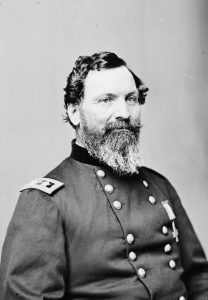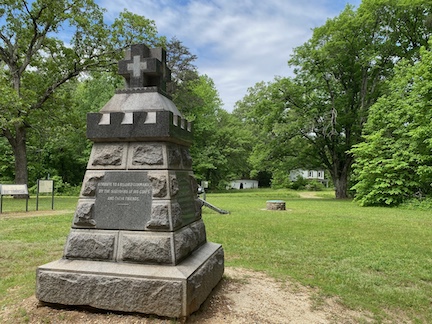The Never-Asked Question About John Sedgwick
 It’s a pleasant late-morning in Spotsylvania. Three guys my age or a little older cluster around a large map of the battlefield painted long ago by Sidney King. A fourth man reads panels in the exhibit shelter. There aren’t any park rangers on duty, and aside from the visitors, the place feels a little deserted—an impression magnified by the leaf detritus and bits of tree bark littered across the sidewalk from an early morning rain shower.
It’s a pleasant late-morning in Spotsylvania. Three guys my age or a little older cluster around a large map of the battlefield painted long ago by Sidney King. A fourth man reads panels in the exhibit shelter. There aren’t any park rangers on duty, and aside from the visitors, the place feels a little deserted—an impression magnified by the leaf detritus and bits of tree bark littered across the sidewalk from an early morning rain shower.
It’s May 9, 2024—the 160th anniversary of the death of Maj. Gen. John Sedgwick, commander of the Federal VI Corps. I’ve come down here as I do every May ninth to pay my respects.

Sedgwick was the highest-ranking Federal officer killed in the Civil War, hit by a Confederate marksman after now-famously contending that the Rebels “couldn’t hit an elephant at that distance.” Maybe not—but they could hit a major general.
“[T]he news of his death fell upon his comrades with a sense of grief akin to the sorrow of a personal bereavement,” noted Horace Porter, aide to Ulysses S. Grant. Grant himself met the news with disbelief. “Is he really dead?” Grant asked. “Is he really dead?” Grant later declared that Sedgwick’s “loss to this army is greater than the loss of a whole division of troops.”
I often cite that line to demonstrate the impact Sedgwick had on the morale of his men. They “mourned his loss as irreplaceable,” one soldier said.
But was Sedgwick irreplaceable? Horatio Wright, who rose to command in Sedgwick’s place, served competently enough at the head of VI Corps for the rest of the war. That’s no small think considering the turnover that would happen among his peers: Hancock, Warren, and Burnside would all find themselves out as the months passed. (Turnover at the corps level in the Army of the James was also tumultuous over time.)
This led me to consider a different but related question: What if Sedgwick had lived? What might the impact have been?
What struck me immediately about this question, first and foremost, is that virtually no one ever asks it.
Talking about Stonewall Jackson’s hypothetical survival is a Civil War cottage industry. People ask about John Reynolds all the time. What if James Longstreet hadn’t been wounded in the Wilderness? What if Bishop Polk hadn’t been disemboweled at Pine Mountain? (Most observers today suggest that the Polk-killing artillery shell was a good shot for both the North and the South.)
Sedgwick’s memory, by contrast, seems to have settled comfortably into its martyrdom the way a friendly grandpa settles into his recliner for a short nap after a pleasant afternoon watching baseball on TV. He’s earned his rest, people seem to collectively suggest: let him nap.
Sedgwick is not someone I ever describe as having much razzle-dazzle, and that had certainly been true of him thus far in the Overland Campaign. He seemed content to trade shots with Confederates in the Wilderness, and when they finally caved in his flank on the evening of May 6, darkness did as much to bring the attack to an end as Sedgwick’s personal leadership did.
On May 8 at Spotsylvania, he deferred to V Corps commander Gouverneur K. Warren, his less-experienced junior. He went so out of his way to defer to Warren—in what I would characterize as a well-meaning attempt to “get along”—that their boss, George Gordon Meade, would snap that night at Sedgwick: “I desire you to take command of your own corps!”
What thanks did Sedgwick get from Warren for his efforts? At the time Warren received news about Sedgwick’s death, he was writing a nastygram to Meade about Sedgwick and Hancock; Warren smartly chose not to send it.
What if Sedgwick had lived? He was personally brave and certainly well-liked by most of his peers, but he’d lost important confidences, too. His record in the campaign was not especially strong, and conditions for the men and the personal strain on the officers was only going to get worse. How might he have held up?

From the Sedgwick monument on the Spotsylvania battlefield, I can see a house recently purchased by the American Battlefield Trust. It’s slated for eventual demolition as part of an effort to restore the battlefield to its wartime appearance. When I give tours, I stand at this spot and, when I talk about Sedgwick, I actually gesture toward that house. “Sedgwick loved his men,” I tell guests. “When he was campaigning, he typically didn’t take over someone’s house as a headquarters. [Gesture] He preferred to be in the field with his men, sleeping under the stars.”
How would he have handled the deprivations of the Overland Campaign? The stress and strain? The unrelenting nature of it all?
The answers are unknowable. I am, at the least, glad to have new question to ponder.
* * *
You can read a first-hand account of Sedgwick’s death penned by Martin T. McMahon, his chief of staff, who was standing right next to Sedgwick.
Five years ago, on May 9, 2019, Edward Alexander sorted through the myths and misinformation about Sedgwick’s death in this excellent blog post.
If you go to the search bar and type in “John Sedgwick,” you’ll get a nice, long list of all the pieces we’ve done about him over the years, particularly in relation to his death (including many similar reflections I’ve written on the anniversary).
Do you agree with those historians who say he was never the same after Antietam?
I think he rose beyond the level where he was best suited. I don’t think he stunk as a corps commander, but he was better suited to be on the lines where he could scrap it up.
Jubal Early seizes Washington, because Sedgwick had used up all of his “fast days” on July 2, 1863….
or …
He gets shot by a sniper at Cedar Creek…..
You must also consider the PTSD suffered by Sedgwick vicinity of Saunders Field, when the head of a soldier standing next to him was taken off by round shot splattering Sedgwick with blood and brains. And you should remember Hancock was living and fighting with a 19 century catheter from his wound at Gettysburg. Cut him some shack. No one else would have stood up with that type of wound, serving as Grant’s lightning rode throughout the Overland campaign until Petersburg. And stayed the course to wait until the last minute before hanging Mary Surrant, hoping the President Johnson would act on the request for pardon. Hancock was and still is, “The finest officer in the Union Army in the immediate presence of the enemy.”
Thanks for honoring Major General John Sedgwick each May 9. That is a good question- what would have happened if he lived? I am surprised by his famous elephant statement. His severe wounding at Antietam should have made him think twice about that statement. Reminds me of Ernie Pyle getting hit by a sniper, not the quote.
Ernie Pyle is one of my journalism heroes. What a tragedy to lose him. He was a brilliant writer.
Yes, you made a good choice. Ernie Pyle was a great writer, connected with everyone and was beloved! The soldiers, especially, loved him like John Sedgwick.
Excellent post, Chris. The “Sedgwick was killed here” monument was my first landmark upon venturing onto the Spotsylvania battlefield a long, long time ago.
Thanks, Brian. I’d like to visit his monument at West Point some day, and perhaps even make it to his grave at Cornwall Hollow.
Interesting that you visit annually.
It’s close by. I kind of see it as my duty to pay my respects to these men every year since I spend so much time with their stories.
Along the “What if” lines, I read that Meade had wanted to assign Sedgewick to the Shenandoah Valley. Franz Sigle was sent instead. So “what if” Sedgewick had been sent there? Obviously we can’t know, but it is as relevant and ‘fair’ of a question as is anything else.
Thank-you. You got me interested in John Sedgewick and I appreciate the links.
I first got to “know” him while working with Kris White on our book about Second Fredericksburg. And as I grew deeper into Spotsy over the years, he became a lynchpin of the story for me. I’ve really grown to respect him over the years.
Chris, it’s a pleasure to hear from you. You make it so interesting. Thanks.
Thanks!
I’ve read that McPherson was the highest ranking general (Union) killed in the War, since he was commander of an Army. A little clarification here?
Thanks,
Randy Bailey
Sedgwick was the highest ranking general by seniority. He was appointed a major general of volunteers effective July 4, 1862. McPherson date of appointment to major general of volunteers was Oct. 8, 1862. The command held (army, corps, etc.) does not affect seniority.
Thanks, Bolts, for jumping in there.
My ECW colleague Chris Kolakowski has written some posts that explore these ideas a bit more:
https://emergingcivilwar.com/2021/08/06/fallen-leaders-generals-deaths/
always wonder why he didn’t have energy to Hussle
after Lee after the battle of Gettysburg. If he gambled a day earlier he could of beat Lee to Hagerstown
Chris: An interesting question. I see a similarity of the (incessant and tired) Stonewall hypothetical and this one. Jackson, as we know, had a consistently mediocre tactical record (First Kernstown, McDowell, Port Republic, Seven Days, Cedar Mountain, Brawner’s Farm, August 31, 1862, Hamilton’s Crossing) – which is different from his record of operational maneuver. That never seems to be a focus in the hypothetical, most notably in the endless “Stonewall at Cemetery Hill” scenario. I see something like this in Sedgwick at corps command. His performance at Second Fredericksburg was far from impressive. He wasn’t tested at Gettysburg. And Jeff Hunt in his excellent Rappahannock Station study is critical of Sedgwick’s performance there. Obviously, these questions cannot be resolved with any certainty. But there is good reason to question whether Sedgwick would have been any more effective than Wright.
Thanks for remembering General Sedgwick …. I don’t think he would ranked among the top AOP Corps Commanders had he lived … although other than Hancock and Meade, it’s hard to recall any real standouts.
One thing they all had in common, however, was tremendous personal courage … that goes for the general officers on the other side as well … they were easily seen on the battlefield, typically mounted, accompanied by their staffs, and often out in front leading their troops … so, they drew a lot of fire … and while Sedgwick was not on the line when he was killed, his personal courage was evidenced by his comment … while others were taking cover, he was standing tall.
That’s how I recall Uncle John … thanks for the reminder.